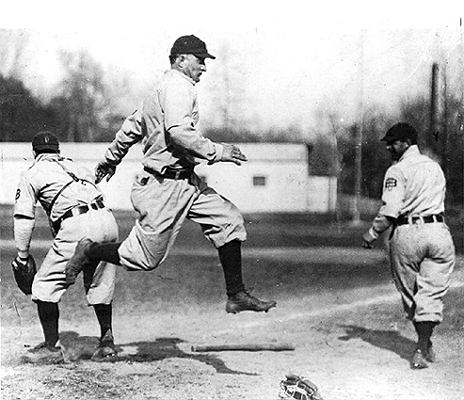

John Peter "Honus" Wagner(18), "The Flying Dutchman," Charter member baseball's Hall of Fame, 1936.(19) BORN: 24 February 1874.(20) DIED: 6 December 1955.(21) BURIED:
"Saga" from the Bulletin Index 7 September 1939.
The late John J. McGraw thought Honus Wagner was baseball's greatest player, and so thinks many another oldtimer today. Few years ago baseball scribes reverently passed bowlegged Pirate Wagner into baseball's Hall of Fame at Cooperstown, N. Y., making him first, along with Ty Cobb and Babe Ruth, to cross the threshold of diamond immortals. Nor is Honus Wagner without honor in his own city. "Wagner Days" were common in 1902, 1903, 1909, years when the Flying Dutchman and the Pirates were bowling over the rest of the National League. There was a Wagner Day all over the circuit when he stepped out of active, major-league playing harness in 1917, and another day of kudos when he returned to the Pirates as a coach in 1932.
Wagner Day this week--Saturday--may or may not be the last to find Honus in active service. He is 65 and silver-haired now, and has made a living out of baseball for 50 years. John Peter Wagner, born in Carnegie (then Mansfield) of German extraction, played on sandlot teams as a youngster, along with his four brothers--Albert reached the majors, had a long professional career as a shortstop--and first made a name for himself with St. Luke's in the Allegheny County League.
He broke into that league by pure chance. When St. Luke's second baseman--the late Attorney John S. Robb--hurt his ankle, Honus was called from the crowd as a substitute. As he shuffled out to short in Robb's shoes, which were three sizes too big, the spectators derided "the kid." "Hey, big feet! Try catching them with your shoes!" Honus scooped up the first hard smash down his way, snapped it to first for the putout. By day's end he had a job, at $3 to $5 a game.
Honus hated to leave Pittsburgh and refused all offers for several years, but when he at last succumbed in 1893 and joined the Twin City, O. team, he began to move speedily and often. He was the scourge of the Iron & Oil League in 1896 when the Pirates bought him, shipped him to Patterson, N. J. Barney Dreyfuss came to look him over, was unimpressed, was finally persuaded to sign the youngster for $2,000 a year. That was the beginning of a long hitch with shrewd little Barney Dreyfuss and, as it turned out, with the Pirates.
Pirate.
Dreyfuss owned the Louisville Nationals, but he bought the Pirates too,
and the two clubs merged when the league boiled down from twelve to eight
teams. This is what Honus Wagner did in 21 years of major league baseball:
Led the league eight times in batting, still a record.
Hit .300 for 17 years in succession against spitballs, other trick pitches with a "dead" ball.
Hung up a world series record, in 1909, of six stolen bases.
Fielded .945 in every position except catcher.
Batted out a lifetime average of .329
His top salary was $10,000. He never had a salary squabble with Barney Dreyfuss. One lean year when Owner Dreyfuss asked him to take a slash, Honus acquiesced without a murmur. Dreyfuss tore up the written contract, gave him a new one with a $1,000 raise. "You're a good sport," he said, "and so am I." The idol of the fans, he was naturally a drawing card--the Babe Ruth of his day--but it was his misfortune to reach the heights before the day of the big gate.
Perhaps the high spot of Honus Wagner's career was the world's series of 1909, when the Pirates trounced the Detroit Tigers for the championship. There was little wagering on the outcome of the games, but a great many plunges on whether the Flying Dutchman would out-shine the Georgia Peach, Ty Cobb. As it happened Cobb went into a slump while Honus batted sensationally, pilfered half a dozen bases and fielded everything within the county limits. Ty Cobb later garnered a fortune by investing in Coca-Cola, in contrast to his easy-going rival who never was a businessman.
Figure.
Hans Wagner was 43 when he left the Pirates. He had a brief, unhappy four
days as manager before he quit, but he has been a happy figure ever
since, never veering far from his great love, baseball. He coached
Carnegie Tech's nine for four years. He formed the Wagner All-Stars, a
semi-pro outfit, and barnstormed the country, chewing tobacco and
scampering around first base until he was well into his fifties. The
big, gnarled, basket hands never lost their cunning, the sharp eyes
under the craggy brow never dimmed; only the bowlegs weakened. He
served six years as high commissioner of semi-pro baseball. On the side
Honus was a great basketball player, a crack hunter & fisher, and
even an actor--an independent movie company starred him in several four
reelers. His one unhappy experience, possibly, was the sporting goods
store venture. Innocent of business shrewdness, Honus lost money,
though he still proudly and loyally sells for the five Wagner stores.
At Forbes Field, telling tall stories to his mates or lobbing practice balls in to the batters, Coach Honus Wagner is still a figure. Says he, proudly: "I haven't missed a day since 1932; not a minute."